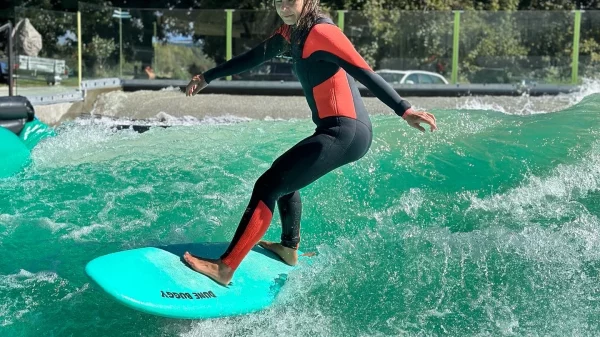In the latest installment of Surf Park Central’s INSIDERS, Dr. Jess Ponting chats with co-author Dr. Leon Mach about their just-released research paper that puts real numbers on the value of international surf tourism for the first time. The paper also turned up some unexpected results regarding surfer attitudes towards sustainability that provides insights into the purchasing behaviors of some key surf park users. Surf Park Central spoke to the authors about their research and the latest INSIDERS episode in which they review existing surf travel research before diving headlong into their study.
“This was the first time a demand-side study of surf tourism expenditure achieved a sufficient sample size to speak with a high degree of confidence about the generalizability of the results,” says Leon Mach.
The dataset contains representative samples from Australia, California, East Coast US, the UK, continental Europe, and Germany.
The sample was broad and large enough to be considered representative of the global surf population with a 3% margin of error. The results determined the value of pre-Covid international surf travel, finding that surfers take an average of 0.928 international surf trips per year, with 40% taking more than one trip each year. “By multiplying the average number of trips by average trip expenditure across the surfing population we were able to arrive at a figure for global spending on international surf travel that is robust and reliable,” says Mach.
Previous studies have shown that surf travelers are more concerned than the general travelling-public about issues of sustainability. However, Mach and Ponting’s new study found that while surfers are willing to pay more for sustainable experiences, their concern did not extend to changing their own behaviors beyond taking the time to research and choose a sustainable surf tourism vendor. In other words, surf travellers don’t want to work too hard for it, they expect their surf tourism providers to demonstrate a commitment to protecting local environments, cultures, and peoples, and providing economic benefits and opportunities to communities in their destination.
In a surprising twist, concern about and willingness to pay for sustainability was significantly higher levels among beginners, women, and longboarders than other groups, particularly shortboarders and expert surfers.
Based on the data, Ponting reasons that “…at least some of these groups are likely to have been drawn to surfing later in life by its aesthetic and perceived relationship to nature, wellness, spirituality, and sustainability. More advanced surfers tend to have grown up in the sport from a young age”.
Regardless of the reasons underpinning the disproportionately high concern and willingness to pay for sustainability, beginners, women, and longboarders are segments of great interest to surf park operators. Research suggests that they are more likely to utilize smaller, weaker waves in parts of the pool designed for intermediate/beginner surfers that may be harder to sell at full capacity. These waves use less energy (and are thus cheaper to produce) and are far more profitable where multiple beginners can utilize a single small spilling wave composed of leftover energy from a larger and higher quality primary wave.
New surfers are also more likely to utilize value-added services such as lessons, video analysis, training, and gyms, as well as potentially buy surfing equipment from the surf parks’ retail outlets. “I think it is quite interesting to consider that these super-desirable segments might be attracted to a surf park experience through sustainability messaging,” says Ponting.
Ponting and Mach are launching a new survey in the coming weeks to update their data, test the elasticity of demand for surfing during the Covid pandemic, and assess the likely post-Covid travel plans of surfers. The survey will also probe the likelihood of regional surf parks travel substituting for international surf trips into the future.
An analysis of all existing data broken down by geography will be available to INSIDERS members in a series of whitepapers over the coming months.
Dr. Leon Mach is an Associate Professor in Environmental Policy and Socioeconomic Values at the School for Field Studies in the Center for Tropical Island Biodiversity Studies based in the rather surf-rich region of Bocas del Toro, Panama.
Dr. Jess Ponting is an Associate Professor at San Diego State University’s L. Robert Payne School of Hospitality and Tourism Management, founder and Director of the Center for Surf Research, co-founder and Head of Research at STOKE Certified, co-founder and Head of Research at Surf Park Central and host of the INSIDERS video interview series.
To watch the full episode now, join Surf Park Central’s exclusive Insiders’ access













You must be logged in to post a comment Login